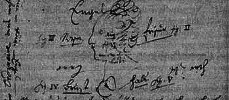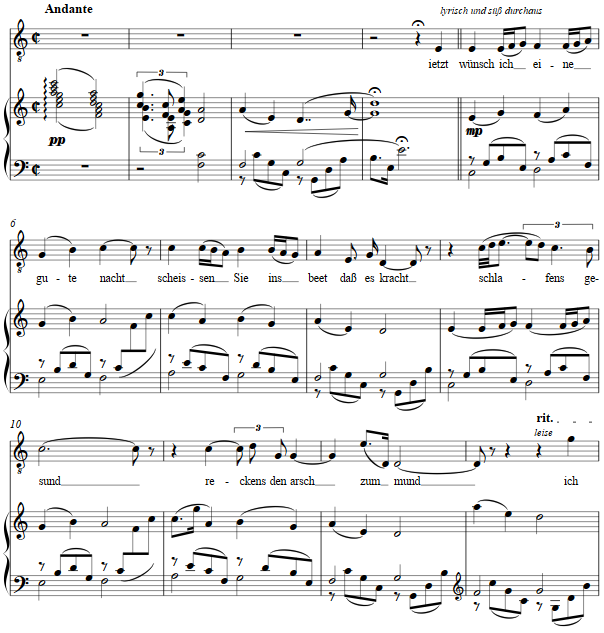Music and Texts of GARY BACHLUND
Vocal Music | Piano | Organ | Chamber Music | Orchestral | Articles and Commentary | Poems and Stories | Miscellany | FAQs
eine gute nacht - (2015)

W. A. Mozart
for tenor and piano
"iezt wünsch ich eine gute nacht, scheissen sie ins beet daß es kracht; schlafens gesund, reckens den arsch zum mund, ich gehe izt nach schlaraffen, und thue ein wenig schlaffen. Morgen werden wir uns gescheüt sprechen brechen. ich sage ihnen eine sache menge zu haben, sie glauben es nicht gar können; aber hören sie morgen es schon werden.".
3 pages, circa 2' 40"
Detail from Mozart's letter with sketch
"Now I wish you good night, shit in your bed and make it burst; sleep soundly, and try to kiss your own behind, as now I go to lazy lusciousness, and have a little sleep.
In the morning we can bring up clever things. I'll tell you a bunch that you could not believe, but tomorrow you'll hear it all."
Schlaraffendland, which is abbreviated in the text, was the Cockaigne, that medieval, mythic utopia in which pleasure was immediately satisfied. The graphic detail above shows the humor with which the letter was penned, such that we see as well as read of such wit. The odd spellings and word play are of his life and times, and therefore worth retaining and enjoying again. Other instances of the term are found, one from Hans Sachs (1493-1576) who penned his poem titled Das Schlaraffenland.
From modern perspectives much has been written about Mozart's youthful coarseness, stating various psychosexual theories and even Tourette's as causes. I take these words as coarsely playful, at best. One finds such an opinion from others as well: "If the anarchy of his written words seems at odds with the beauty of his music, the misunderstanding is ours. In fact, the prose style seems to have been infected by the tropes of music itself, repetitions, perseverations, decorations, variations and inversions (he often signed himself Trazom Gnagflow), in a polyglot manner more Finnegans Wake than Ulysses. The only paradox is that anyone ever thought there was one." In "Trazom Gnagflow in his own words," by Fiona Maddocks, in a review of Mozart's Letters, Mozart's Life: Selected Letters, translated and edited by Robert Spaethling, Guardian UK, 24 September 2000.
As to such prose style, the letter is signed "Wolfgang Amadé Rosenkranz, Miehnnam ned net5 rebotco 7771." Reading the letter's location and date backwards was part of such play, as were seemingly coarse vocabulary, if "Rosenkranz" is to be taken as he represented himself so humorously.
For this, a sweet accompaniment of triadic simplicity underpins a melodic line marked as to be 'lyrical and sweet.' The form for the Lied is a simple verse form imposed onto the words of Mozart's letter of 5 November 1777 to Mozart's cousin Maria Anna Thekla Mozart. While the seeming coarse words clutter, the theme remains "a good night."
The score is available as a free PDF download, though any major commercial performance or recording of the work is prohibited without prior arrangement with the composer. Click on the graphic below for this piano-vocal score.

